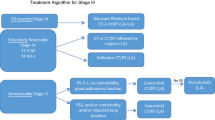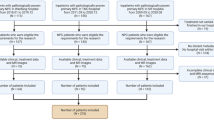Abstract
Treatment for patients with advanced NSCLC generally consists of chemotherapy, but response rates are modest and recurrence occurs for most patients after standard first-line platinum-based doublet therapy. Tailoring therapy to individual patient according to certain prognostic and predictive factors has the potential to improve outcome in NSCLC. This review focuses on the most important molecular prognostic and/or predictive factors in the treatment of advanced NSCLC; considering these molecular features, we also suggest a molecular-based treatment algorithm.


Similar content being viewed by others
References
Jemal A, Siegel R, Ward E, et al. Cancer statics 2009. CA Cancer J Clin. 2009;59:225–49.
Coate LE, John T, Tsao MS, Shepherd FA. Molecular predictive and prognostic markers in non small cell lung cancer. Lancet Oncol. 2009;10:1001–10.
Shin C, Chen VJ, Gossetti LS, et al. LY231514, a pirrolo [2, 3-d]pyrimidine-based antifolate that inhibits multiple folate requiring enzymes. Cancer Res. 1997;57:1116–23.
Scagliotti G, Hanna N, Fossella F, et al. The differential efficacy of pemetrexed accordino to NSCLC histology: a review of two phase III studies. Oncologist. 2009;14:253–63.
Schultz RM, Chen VJ, Bewley JR, et al. Biological activity of the multitargeted antifolate, MTA (LY231514), in human cell lines with different resistance mechanisms to antifolate drugs. Sem Oncol. 1999;26(Suppl. 6):68–73.
Takezawa K, Okamoto I, Okamoto W, et al. Thymidylate synthase as a determinant of pemetrexed sensitivity in non-small cell lung cancer. Br J Cancer. 2011 Apr 12 [Epub ahead of print].
Ceppi P, Volante M, Saviozzi S, et al. Squamous cell carcinoma of the lung compared with other histotypes shows higher messenger RNA and protein levels for thymidylate synthase. Cancer. 2006;107:1589–96.
Gandara DR, Grimminger PP, Mack PC, et al. Histology and gender related associations of ERCC1, RRM1 and TS biomarkers in 1802 patients with NSCLC: implications for therapy. J Clin Oncol (meeting abstracts). 2010;28:7513.
Tanaka F, Wada H, Fukui Y, et al. Thymidylate synthase (TS) gene expression in primary lung cancer patients: a large-scale study in Japanese population. Ann Oncol. 2011 Feb 14 [Epub ahead of print].
Rossi A, Galetta D, Gridelli C. Biological prognostic and predictive factors in lung cancer. Oncology. 2009;77:90–6.
Johnson DH. Gemcitabine for the treatment of non small cell lung cancer. Oncology. 2001;3:33–9.
Bepler G, Sharma S, Cantor A, et al. RRM1 and PTEN as prognostic parameters for overall and disease free survival in patients with non small cell lung cancer. J Clin Oncol. 2004;22:1878–85.
Zheng Z, Chen T, Li X. DNA synnthesis and repair genes RRM1 and ERCC1 in lung cancer. N Engl J Med. 2007;356:800–8.
Bepler G, Kusmartseva I, Sharma S, et al. RRM1 modulated in vitro and in vivo efficacy of gemcitabine and platinum in non small cell lung cancer. J Clin Oncol. 2006;29:4731–7.
Rosell R, Danenberg KD, Alberola V, et al. Ribonucleotide reductase messenger RNA expression and survival in gemcitabine/cisplatin-treated advanced non small cell lung cancer patients. Clin Cancer Res. 2004;10:1318–25.
Yang LY, Li L, Jiang H, et al. Expression of ERCC1 antisense RNA abrogates gemcitabine-mediated cytotoxic synergism with cisplatin in human colon tumor cells defective in mismatch repair proficient in nucleotide excision repair. Clin Cancer Res. 2000;6:773–81.
Simon GR, Sharma S, Cantor A, et al. ERCC1 expression is a predictor of survival in resected patients with non small cell lung cancer. Chest. 2005;127:978–83.
Olaussen KA, Dunant A, Fouret P, et al. DNA repair by ERCC1 in non small cell lung cancer and cisplatin based adjuvant chemotherapy. N Engl J Med. 2006;355:983–91.
Cobo M, Isla D, Massuti B, et al. Customizing cisplatin based on quantitative excision repair cross-complementing 1 mRNA expression: a phase III trial in nonsmall cell lung cancer. J Clin Oncol. 2007;25:2747–54.
Lee HW, Choi YW, Han JH, et al. Expression of excision repair cross-complementation group 1 protein predicts poor outcome in advanced non small cell lung cancer patients treated with platinum-based doublet chemotherapy. Lung Cancer. 2009;65:377–82.
Vilmar AC, Santoni-Rugiu E, Sorensen JB. ERCC1 and histopatology in advanced NSCLC patients randomized in a large multicenter phase III trial. Ann Oncol. 2010;21:1817–24.
Hoffmann AC, Gauler T, Parr A, et al. Use of ERCC1 expression levels in circulating tumor cells to predict response to platinum-based chemotherapy in patients with non-small cell lung cancer. J Clin Oncol (Meeting Abstracts). 2010;28:7512.
Rosell R, Cobo M, Isla D, et al. Applications of genomics in NSCLC. Lung Cancer. 2005;50(Suppl 2):S33–40.
Rosell R, Skrzypski M, Jassem E, et al. BRCA1: a novel prognostic factor in resected non small cell lung cancer. PLos ONE. 2007;2:e1129.
Taron M, Rosell R, Felip E, et al. BRCA mRNA expression levels as an indicator of chemoresistance in lung cancer. Hum Mol Genet. 2004;132443–49.
Rosell R, Perez-Roca L, Sanchez JJ, et al. Customized treatment in non small cell lung cancer based on EGFR mutations and BRCA1 mRNA expression. PLos ONE. 2009;4:e5133.
Wang B, Matsuoka S, Ballif BA, et al. Abraxas and RAP80 form a BRCA1 protein complex required for the DNA damage response. Science. 2007;316:1194–8.
Lynch TJ, Bell DW, Sordella R, et al. Activating mutations in the epidermal growth factor receptor underlying responsiveness of non small cell lung cancer to gefitinib. N Engl J Med. 2004;350:2129–39.
Rosell R, Moran T, Queralt C, et al. Screening for epidermal growth factor mutations in lung cancer. N Engl J Med. 2009;361:958–67.
Mok TS, Wu YL, Thongprasert S, et al. Gefitinib or carboplatin-paclitaxelin pulmonary adenocarcinoma. N Engl J Med. 2009;361:947–57.
Shepherd FA, Rodrigues PJ, Ciuleanu T, et al. Erlotinib in previously treated non small cell lung cancer. N Engl J Med. 2005;353:123–32.
Cappuzzo F, Ciuleanu T, Stelmakh L, et al. Erlotinib as maintenance treatment in advanced non small cell lung cancer: a multicentre, randomised, placebo-controlled phase 3 study. Lancet Oncol. 2010;11:521–2925.
Stinchcombe TE, Baggstrom MQ, Somaiah N, et al. Summary of presentations from the 46th annual meeting of the American society of clinical oncology. J Thorac Oncol. 2011;6:227–32.
Lee JS, Park K, Kim SW, et al. A randomized phase III study of gefitinib (IRESSA) versus standard chemotherapy (gemcitabine plus cisplatin) as a first-line treatment for never-smokers with advanced or metastatic adenocarcinoma of the lung. J Thorac Oncol. 2009; 4 (Suppl): Prs.4.
Mitsudomi T, Morita S, Yatabe Y, et al. Gefitinib versus cisplatin plus docetaxel in patients with non small cell lung cancer harbouring mutations of the epidermal growth factor receptor (WJTOG3405): an open label, randomised phase 3 trial. Lancet Oncol. 2010;11:121–8.
Maemondo M, Inoue A, Kobayashi K, et al. Gefitinib or chemotherapy for non small cell lung cancer with mutated EGFR. N Engl J Med. 2010;362:2380–8.
Zhou C, Wu YL, Chen G, et al. Efficacy results from the randomised phase III OPTIMAL (CTONG 0802) study comparing first-line erlotinib versus carboplatin plus gemcitabine in Chinese advanced non small cell lung cancer patients with EGFR activating mutations. Ann Oncol. 2010; 21 (Suppl 8) ESMO 2010; Abstract LBA13.
Bria E, Milella M, Cuppone F, et al. Outcome of advanced NSCLC patients harboring sensitizing EGFR mutations randomized to EGFR tyrosine inhibitors or chemotherapy as first-line treatment: a meta-analysis. Ann Oncol. 2011; Feb 16 [Epub ahead of print].
Brevet M, Johnson ML, Azzoli CG, et al. Detection of EGFR mutations in plasma DNA from lung cancer patients by mass spectrometry genotyping is predictive of tumor EGFR status and response to EGFR inhibitors. Lung Cancer. 2010; Dec 2 [Epub ahead of print].
Soda M, Choi YL, Enomoto M, et al. Identification of the transforming EML4-ALK fusion gene in non small cell lung cancer. Nature. 2007;448:561–6.
McDermott U, Iafrate AJ, Gray NS, et al. Genomic alterations of anaplastic lymphoma kinase may sensitize tumors to anaplastic lymphoma kinase inhibitors. Cancer Res. 2008;68:3389–95.
Kwak EL, Bang YJ, Camidge DR, et al. Anaplastic lymphoma kinase inhibition in non small cell lung cancer. N Engl J Med. 2010;363:1693–703.
Gandara DR, Mack PC, Li T, et al. Evolving treatment algorithms for advanced non small cell lung cancer: 2009 looking toward 2012. Clin Lung Cancer. 2009;10:392–4.
Keedy VL, Termin S, Somerfield MR, et al. American Society of Clinical Oncology provisional clinical opinion: epidermal growth factor receptor (EGFR) mutation testing for patients with advanced non small cell lung cancer considering first-line EGFR tyrosine kinase inhibitor therapy. J Clin Oncol. 2011; Apr 11 [Epub ahead of print].
National Comprehensive Cancer Network (NCCN) Clinical Practice Guideline in oncology for Non Small Cell Lung Cancer, Version 3.2011.
Zhang L, Yang H, Xu J. Gene expression significance in personalized medicine of non small cell lung cancer and gene expression analyzing platforms. Curr Drug Metab. 2011;12:455–9.
Conflict of interest
None declared.
Author information
Authors and Affiliations
Corresponding author
Rights and permissions
About this article
Cite this article
Tartarone, A., Lerose, R., Gallucci, G. et al. Evaluation of molecular prognostic and predictive factors: an important step towards personalised treatment in non small cell lung cancer. Med Oncol 29, 1599–1605 (2012). https://doi.org/10.1007/s12032-011-9992-y
Received:
Accepted:
Published:
Issue Date:
DOI: https://doi.org/10.1007/s12032-011-9992-y




